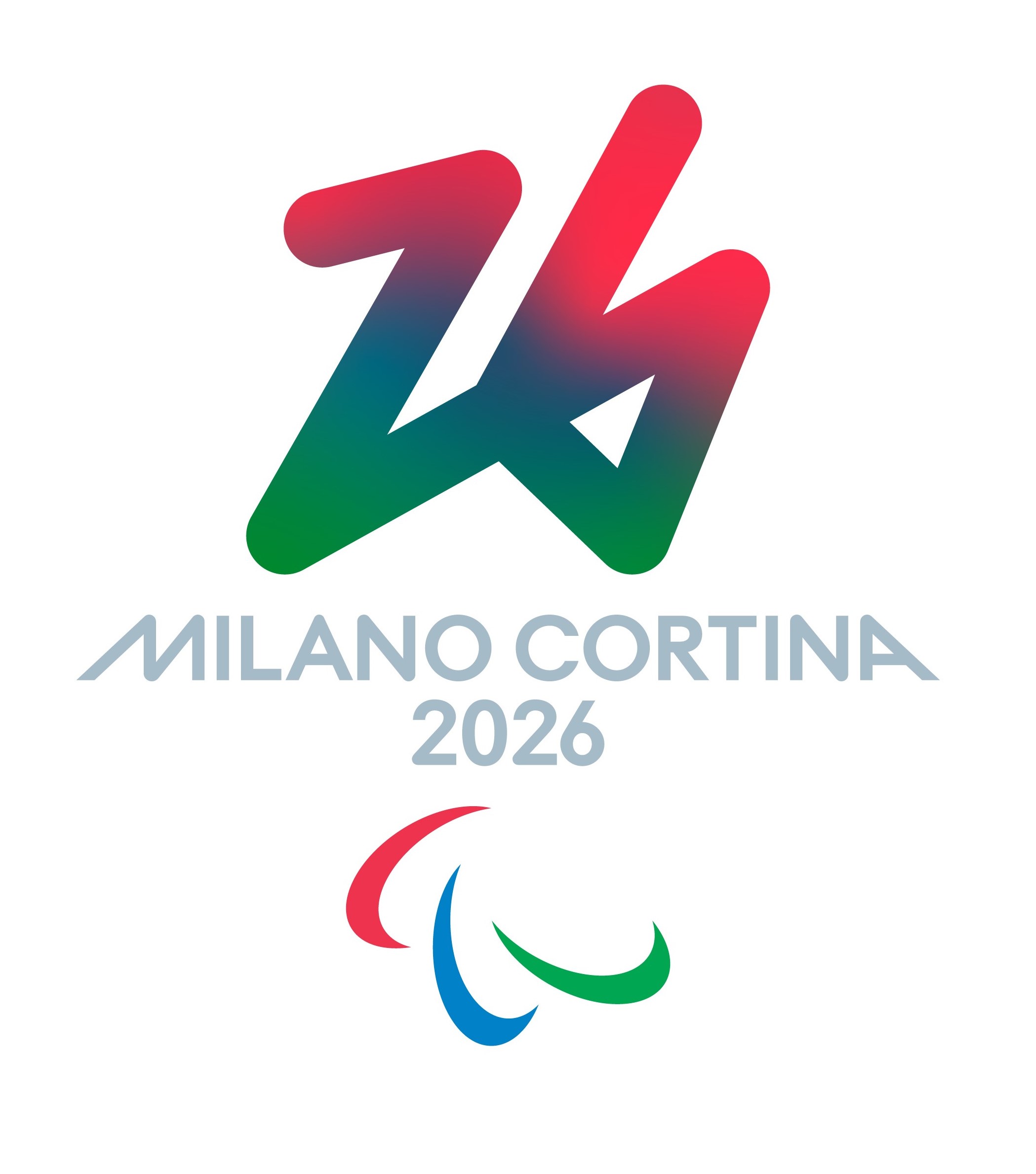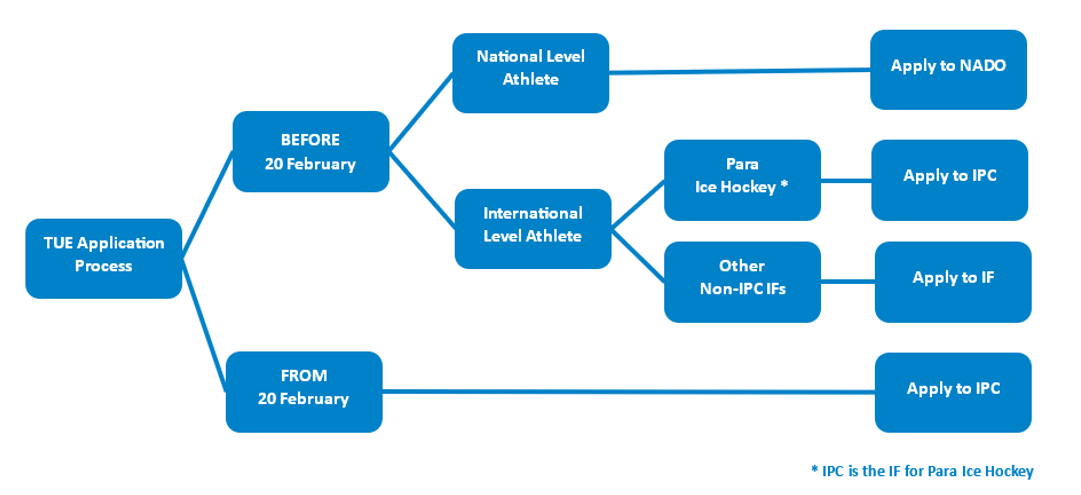Milano Cortina 2026 Paralympic Winter Games – Anti-Doping Programme
This webpage provides National Paralympic Committees and National/Regional Anti-Doping Organisations with information about the anti-doping programme at the Milano Cortina 2026 Paralympic Winter Games. It will be updated as more information becomes available.
Key Dates
| 20 February | All athletes requiring a TUE must apply to the IPC TUE Committee from this date |
| 28 February | Opening of the Paralympic Village / Start of the Games Period |
| 6 March | Opening Ceremony |
| 7 March | Competition Starts |
| 15 March | Closing Ceremony / End of the Games Period |
Roles & Responsibilities
The International Paralympic Committee (IPC) is responsible for directing the anti-doping programme at the Milano Cortina 2026 Paralympic Winter Games, from the opening of the Paralympic Village on 28 February 2026 up to and including the day of the Closing Ceremony on 15 March 2026.
The Milano Cortina 2026 Organising Committee (MiCo2026) and the National Anti-Doping Organisation of Italy (NADO Italia) will cooperate closely with the IPC in the delivery of the doping control activities, both prior to and during the Games.
| Testing Authority (TA) | IPC |
| Sample Collection Authority (SCA) | MiCo2026 |
| Results Management Authority (RMA) | IPC |
IPC Anti-Doping Code
The IPC Anti-Doping Code (IPC Games Rules) shall apply during the Games period. Athletes qualified and registered by their National Paralympic Committee (NPC) may be tested at any time during the Games period – or at any time leading up to the Paralympic Games, regardless of their location.
All participants at the Games accept the IPC Anti-Doping Code as a condition of their participation and are presumed to have agreed to comply with it.
Anti-Doping Guide – Milano Cortina 2026 Paralympic Games
The Anti-Doping Guide for the Milano Cortina 2026 Paralympic Winter Games will be available to download here once it is published.
Education First – Before Testing
The IPC supports the “Education First” principle, where an athlete’s first experience with anti-doping should be through education – before being subject to doping control and before they leave their country for their first competition as an international-level athlete.
NPCs are strongly encouraged to liaise with their respective National and Regional Anti-Doping Organisations (NADOs and RADOs) to ensure that athletes and athlete support personnel selected to participate in the Paralympic Winter Games receive anti-doping education in advance of the event.
ADEL for Milano Cortina 2026
The IPC is again collaborating with WADA and its Anti-Doping Education and Learning (ADEL) platform to develop an “ADEL for Milano Cortina 2026” eLearning course. This course is aimed at athletes and support personnel and will provide an overview of the anti-doping programme at the Games including key dates, roles and responsibilities and the TUE application process.
ADEL for Milano Cortina 2026 will be launched in the second quarter of 2025, initially in English and French with other languages becoming available over time.
NPCs are encouraged to make completion of this course mandatory for all members of their delegation participating in the Paralympic Winter Games – particularly in the absence of a robust education programme being available from your NADO or RADO.
*Note: Please ask your athletes, when registering for ADEL, to select the Para sport when setting up their profile. This will ensure their successful completion of the course can be recognised by IPC and other Para sport International Federations.
Other ADEL Courses
In addition, IPC recommends the following education activities also available on ADEL:
- International Level Athletes Education (for athletes)
- Coaches of High-Performance Education (for coaches)
- ADEL for Medical Professionals at Major Games (for medical support personnel)*
* Note: the ADEL for Medical Professionals at Major Games programme is mandatory for all medical doctors who wish to register for the Milano Cortina 2026 Paralympic Winter Games.
Therapeutic Use Exemptions
Athletes sometimes need to take a Prohibited Substance or use a Prohibited Method to treat an illness or medical condition. Before taking any such medication, they must apply for a Therapeutic Use Exemption (TUE). If approved, a TUE permits the athlete to use the prohibited substance or method while competing, without triggering an anti-doping rule violation. A TUE will only be approved if it meets the requirements of the International Standard for TUEs (ISTUE).
Athletes who already have a TUE
If an athlete already has a valid TUE issued by their National Anti-Doping Organisation or International Federation, the TUE must be recognised by the IPC. The athlete or NPC can submit a request for recognition by email to tue@paralympic.org quoting the TUE reference number in ADAMS.
Athletes who need to apply for a new TUE
Prior to 20th February, athletes must determine where to apply for a TUE. If they are considered an International-level Athlete by their IF’s rules they must submit their TUE application to their IF. If not, athletes should contact their National Anti-Doping Organisation (NADO) for further advice.
From 20 February, ALL athletes must apply to the IPC TUE Committee by submitting the completed TUE application form with supporting medical documentation either via ADAMS, or by email to tue@paralmpic.org. Submissions must be in English.
If approved, the TUE will only be valid for the duration of the Games (unless the IPC is the International Federation for the sport).
Medication Check with GlobalDRO
Athletes are 100% responsible for anything found in their sample. Accidentally taking medication that contains a prohibited substance could result in the athlete testing positive and being banned from all sport.
The IPC has developed Medication Check , an online tool that uses the Global Drug Reference Online platform, to check the status of your medication based on the current WADA Prohibited List.
Athletes (and their support personnel) are encouraged to use Medication Check (that uses ) to provide information about the prohibited status of specific medications based MChecking your medication in advance may help an athlete avoid an unintentional positive test, caused by taking a medication that contains a prohibited substance.
Athlete Whereabouts Requirements
Being able to locate athletes for out-of-competition testing, without any advance-notice, is one of the most powerful means of deterring and detecting doping in sport. Any athlete can be tested at any time and any place.
All athletes who are already included in a Registered Testing Pool or Testing Pool must continue to provide sufficient details in their whereabouts filings, so that they can be easily located for testing at any time.
In addition, all NPCs must provide accurate, timely information on arrival/departure dates and rooming list allocations (including for athletes that stay in private accommodations) for ALL athletes competing at the Games.
The IPC will communicate directly with NPCs closer to the Games with more details on how to provide the following whereabouts information:
• NPC name and dedicated contact person
• Athlete name and sport
• Athlete arrival and departure dates.
• Athlete room allocations in the Paralympic Village, including Satellite Villages (and/or any other official or individual accommodations in Italy)
In addition to the above, NPCs will also be asked to provide information for any athletes or other delegation members who may require assistance in the event of an emergency evacuation.
Please note that NPC Upgrade Cards cannot be collected until whereabouts/emergency evacuation information is received and approved by IPC.
Doping Control Guide for Testing Athletes in Para Sport
The IPC’s Doping Control Guide for Testing Athletes in Para Sport is available to download from the anti-doping section of the IPC website.
This guide provides advice on how to prepare for and manage the sample collection process when testing athletes who compete in Para sport. It also provides information about the Para sport classification system (including the types of impairments) and the types of modifications that may be required to complete the sample collection process.
IMPORTANT:
It is the athlete’s responsibility to provide whatever additional equipment is necessary to provide a urine sample, for example, a catheter/drainage system or a urine collection container (Article A.4.7 of the ISTI).
Should an athlete not have the additional equipment necessary to provide a urine sample, the DCO may, at their discretion, allow the athlete the opportunity to locate the equipment they require. The athlete must remain under the observation of the DCO/chaperone throughout.
If the athlete is ultimately unable to provide a sample, due to lack of appropriate equipment, they could be charged with an anti-doping rule violation for failing to submit to doping control.
If unsure what type of collection device is most appropriate for their needs, the athlete should seek advice from a nurse, physician, or occupational therapist.
Milano Cortina 2026 Anti-Doping Taskforce
The IPC is establishing a Milano Cortina 2026 Anti-Doping Taskforce to assist all Anti-Doping Organisations (ADOs) in implementing an effective and coordinated testing programme for athletes likely to compete at the Milano Cortina 2026 Paralympic Games.
As was the case for Paris 2024, the Taskforce will assist the IPC in providing ADOs with testing recommendations, to help ensure their resources are targeted in a way that maximizes both detection and deterrence of doping in Para sports leading up to the Games. The Taskforce is led by the IPC and includes a number of anti-doping experts from around the world, including an athlete representative.
Further to these recommendations, the IPC intends to use the work of the Taskforce to:
- Raise awareness and understanding by ADOs of the risks of doping in Para sport, to inform their testing pools and test planning over the longer term.
- Educate on specific anti-doping needs of Para athletes and their classifications.
- Build or strengthen relationships between National and Regional Anti-Doping Organisations (NADOs/RADOs) and National Paralympic Committees (NPCs).
Click here for more information or contact antidopingtaskforce@paralympic.org.
Speak Up to Report Doping
Anti-doping organisations increasingly rely on information or intelligence provided by individuals to help catch dopers. With this in mind, the IPC has partnered with the World Anti-Doping Agency's 'Speak Up' programme, which receives and processes information via a secure digital platform. If you have witnessed, overheard or have reasonable grounds to suspect doping, you can report it via the Speak Up platform – anonymously if you wish. Any information you provide is strictly confidential.
More Information
If you have any questions or require further information about the anti-doping programme at the Paris 2024 Paralympic Games, please contact antidoping@paralympic.org.

 Facebook
Facebook
 Instagram
Instagram
 Twitter
Twitter
 Youtube
Youtube
 TikTok
TikTok
 Newsletter Subscribe
Newsletter Subscribe


